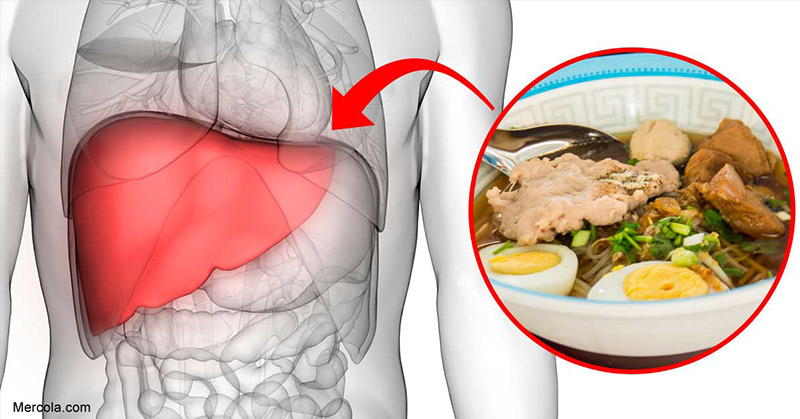This site contains product affiliate links. We may receive a commission if you make a purchase after clicking on one of these links.
When most people think of liver disease, the first thing that pops into their heads is that a few too many alcoholic drinks is the culprit. But there are countless everyday habits that put stress on your liver function. Apart from drinking, eating processed foods like fructose, high fructose corn syrup, refined flours, and fried foods, not to mention taking certain supplements or prescriptions can all add up to an unhealthy liver.
Luckily, you can do much to help support your liver health. Many nutrients such as vitamins C and E, selenium, magnesium, and zinc can contribute to maintaining proper liver function. But one nutrient that often goes unrecognized can play a major role in supporting a healthy liver. Not only does the evidence show it can help prevent fatty liver disease, it might play an important role in preventing cancer. The nutrient? Choline!
What is Choline?
Choline is one of the essential nutrients your body needs for everyday function. You need a healthy intake of choline in your diet to support liver function, brain development, mental health, muscle function, nervous system health, digestion, and metabolic function. (1)
How Much Choline Do You Need?
Some people have a higher risk of choline deficiency than others. Endurance athletes, heavy drinkers, pregnant women and post-menopausal women are more likely to have a choline deficiency. (1)
Otherwise, the average adult man needs about 550 mg/day and the average adult woman needs about 425 mg/day. (2) Too much choline consumption can result in potential side effects including low blood pressure, sweating, and indigestion. (3) The average adult should not exceed 3,500 mg/day. (1)
We recommend Natural Factors Phosphatidyl Choline. Phosphatidyl Choline is a superb daily addition to the diet for anyone seeking safe nutritional support for healthy liver function. It is a preferred form of choline derived directly from lecithin. This versatile phospholipid is also recognized as a nutrient essential to brain function. Get your 30 day supply at The Health Shop for $19.78 while supplies last!
Choline and Disease Prevention
Cancer
Officially, the jury is still out on whether choline plays a role in preventing cancer. Some research suggests a lack of a connection, however several studies seem to point to a strong connection between healthy choline levels and a reduced risk of cancer.
Three separate studies point to a high consumption of choline resulting in a lower risk of breast cancer among women. (4, 5, 6). A fourth study of 1,508 women participants suggests that women who consume a lot of free choline reduce their breast cancer risk by as much as 24%. (7)
Early research from animal studies points to choline deficiencies being associated with a higher risk of liver cancer and sensitivity to environmental toxins, though we can’t be certain there are similar effects in humans (8,14).
Read More: How Eating Broccoli Can Help Prevent Cancer
Non-Alcoholic-Fatty-Liver Disease
The evidence is strong that non-alcoholic fatty liver disease (NAFLD) can be caused by a choline deficiency. (9) There is also some evidence that even a lower than optimal dietary intake of choline can contribute to the risk of NAFLD, however more research is needed to confirm the link. (1)
When scientists studied people on a choline-restricted diet and found that over 70% of them developed liver damage, they saw that the effects were reversed once choline was reintroduced to their eating habits. (10, 11) More research suggested that the lower the choline intake, the more severe the effect on liver health. (12)
Read More: Top Symptoms of Non-alcoholic Fatty Liver Disease
What Are the Best Foods for Choline Consumption?
You have many options for boosting your choline intake, regardless of your dietary style. The top choline sources can be found in meats, cruciferous vegetables, and some nuts: (13)
- Lean beef and beef liver
- Eggs
- Soybeans
- Chicken breast
- Atlantic cod
- Shiitake mushrooms
- Red potatoes
- Wheat germ
- Kidney beans
- Quinoa
- Grass-fed milk and unsweetened milk products
- Brussels sprouts
- Broccoli
- Tuna
- Peanuts
- Cauliflower
- Peas
- Sunflower seeds
- Brown rice
We recommend Natural Factors Phosphatidyl Choline. Phosphatidyl Choline is a superb daily addition to the diet for anyone seeking safe nutritional support for healthy liver function. It is a preferred form of choline derived directly from lecithin. This versatile phospholipid is also recognized as a nutrient essential to brain function. Get your 30 day supply at The Health Shop for $19.78 while supplies last!
Maintaining liver health involves much more than ensuring there’s enough choline in your diet, but that’s a great place to start! Whether you’re one of the at-risk groups of people or not, you should focus on adding choline-rich foods to your regular diet. Ask your medical care provider to evaluate your liver health and discuss appropriate steps for improving it if need be.
Disclaimer: This information is not intended to be a substitute for professional medical advice, diagnosis or treatment and is for information only. Always seek the advice of your physician or another qualified health provider with any questions about your medical condition and/or current medication. Do not disregard professional medical advice or delay seeking advice or treatment because of something you have read here.
Sources
- https://www.healthline.com/nutrition/what-is-choline
- https://lpi.oregonstate.edu/mic/other-nutrients/choline#AI
- https://ods.od.nih.gov/factsheets/Choline-Consumer/
- https://www.ncbi.nlm.nih.gov/pmc/articles/PMC2775010/
- https://www.ncbi.nlm.nih.gov/pubmed/18230680
- https://www.ncbi.nlm.nih.gov/pmc/articles/PMC2430758/
- https://www.ncbi.nlm.nih.gov/pmc/articles/PMC2430758/
- https://lpi.oregonstate.edu/mic/other-nutrients/choline#liver-diseases-prevention
- https://lpi.oregonstate.edu/mic/other-nutrients/choline#AI
- https://www.ncbi.nlm.nih.gov/pubmed/17490963
- https://www.ncbi.nlm.nih.gov/pubmed/20861172
- https://www.ncbi.nlm.nih.gov/pubmed/22338037
- https://ods.od.nih.gov/factsheets/Choline-HealthProfessional/#h3
- https://www.ncbi.nlm.nih.gov/pubmed/23449526

